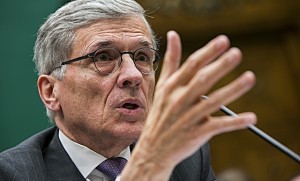Verizon doubles down, says it’s not interested in “fast lanes”

Josh Peterson | Watchdog.org
WASHINGTON, D.C. — Internet “fast lanes” are a “phantasm,” Verizon told a top senator Wednesday.
FAST LANES: Verizon responded to Sen. Patrick Leahy (D-VT), stating that it had no interest in offering the kind of paid prioritization the FCC is considering regulating.
When Senate Judiciary Committee chairman Patrick Leahy, a Vermont Democrat, wrote to Verizon last week, he sought assurances the Internet service provider would not create “fast lanes” through “paid prioritization” deals with applications companies to ensure priority service over the “last mile” — the part of the network that reaches the customer.
Leahy also sent similar letters to Comcast, Time Warner Cable, Charter and AT&T .
Verizon responded in a letter Wednesday, pushing back against efforts to have the Federal Communications Commission bring broadband providers under stricter utility-style regulations, i.e., Title II of the Communications Act of 1934.
Between July and September, the FCC received nearly 4 million comments from the public over regarding Title II, net neutrality and paid prioritization, adding to the million-plus comments sent to the agency during late spring and early summer over the issue. The company said that pro-Title II activists were “fixated on the phantasm” of paid prioritization.
Verizon’s general counsel Randal Milch also weighed in, stating, “As we have said before, and affirm again here, Verizon has no plans to engage in paid prioritization of Internet traffic.”
“Unfortunately, the fever pitch over ‘paid prioritization’ and ‘fast lanes’ among advocates of greater Internet regulation is just demagoguery since no major ISP has expressed an interest in offering ‘paid prioritization’ and all agree that the FCC has a valid legal path to prohibit it,” said Milch.
Michael J. Horney, research associate for the Maryland-based free market think tank, Free State Foundation, wrote in a blog post Wednesday the Title II “would not ban paid prioritization” like net neutrality advocates hope.
Verizon dropped plans to slow down Internet speeds, throttle, unlimited data subscribers at the beginning of October, only weeks before the Federal Trade Commission announced plans to sue AT&T Mobility for slowing down the Internet speeds of unlimited data subscribers.
ISPs engage in throttling as one way to alleviate network congestion.
The FCC is expected to decide whether to reclassify broadband under Title II in December.
Contact Josh Peterson at jpeterson@watchdog.org. Follow Josh on Twitter at @jdpeterson







